
Open Source Salesforce Alternative For Enterprise Applications
Salesforce has started as a CRM system that helped sales teams track leads and close deals from the cloud.
Over time it grew into a vast platform for marketing automation, service desks, analytics, and even custom enterprise apps that run back-office workflows.
Today, as businesses weigh the benefits of its all-in-one ecosystem against rising costs and lock-in, open-source alternatives like Openkoda are emerging as flexible, budget-friendly foundations for modern enterprise software.
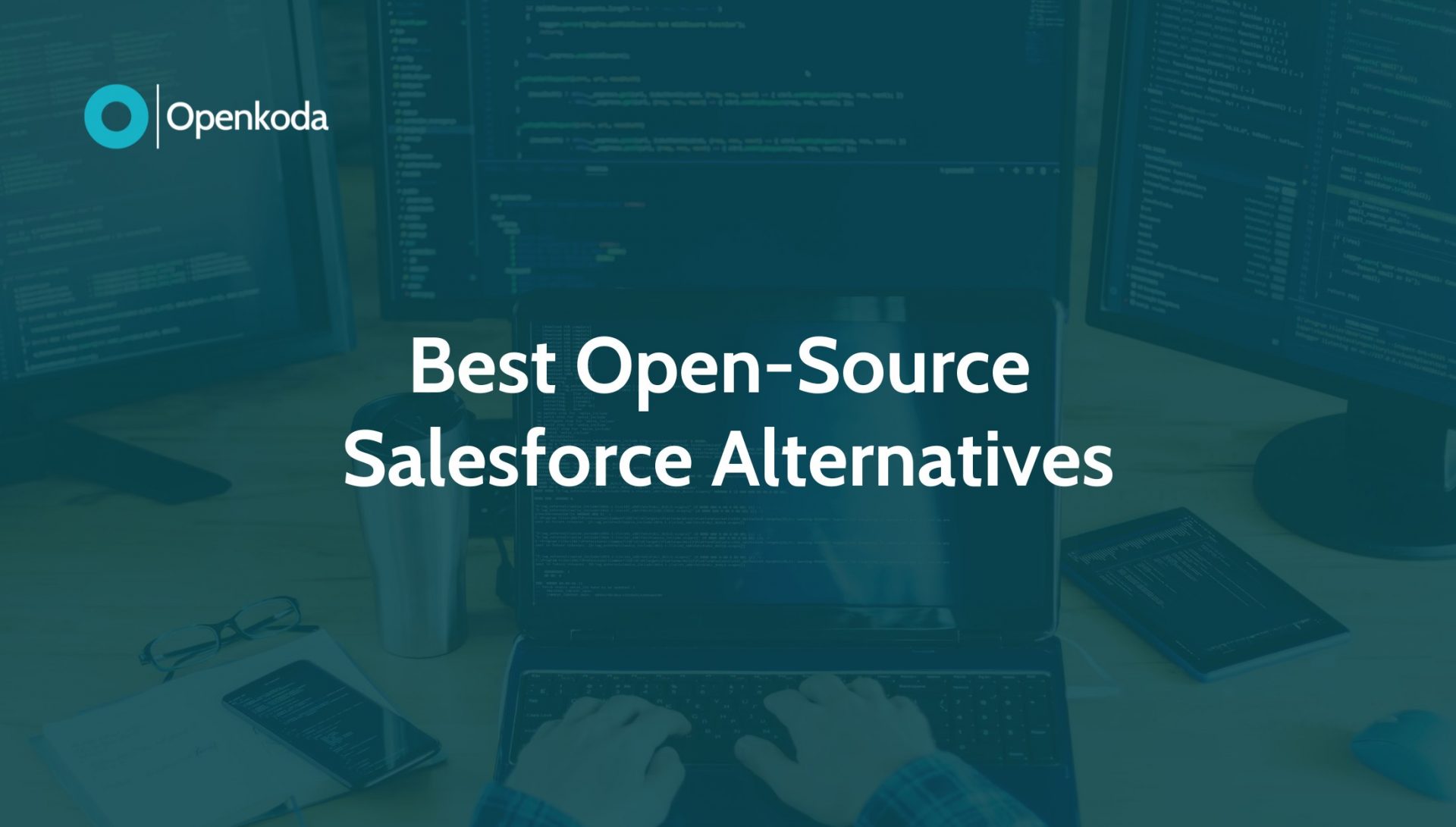
Understanding Salesforce
Salesforce began as cloud-based CRM software designed to help sales teams keep track of leads, deals and follow-up tasks.
Over the years it has expanded into a broad family of CRM solutions that wrap in marketing automation, customer-service consoles, analytics and AI forecasting. At its heart, the platform stores and relates every phone call, email and meeting, so reps spend less time hunting for notes and more time moving deals forward.
Out-of-the-box dashboards and sales automation tools turn that data into forecasts and reminders that keep daily sales processes on schedule.
Because Salesforce offers a drag-and-drop builder, an app marketplace and a programmable layer called Apex, many companies use it for far more than tracking prospects.
Finance teams spin up expense-approval apps, HR teams manage onboarding checklists, and operations groups coordinate field-service visits – all while managing customer data in the same database.
In effect, Salesforce has become a full enterprise-application platform: organizations layer custom objects and logic on top of the core CRM so internal workflows live side by side with customer-facing records.
But there’s also the other side of this coin. Building business tools with Salesforce can very quickly become problematic.
Salesforce: Good, Bad and The Ugly
Salesforce has earned its reputation by delivering a robust, battle-tested customer relationships management software and platform-as-a-service that countless enterprises rely on every hour of the day for managing their customer data and internal processes.
Its good side is easy to praise: a vast marketplace of pre-built apps, deep integration hooks, and a huge ecosystem of partners and certified admins who can coax just about any workflow out of its declarative low-code tools.
Yet the bad inevitably surfaces as companies scale.
Licensing feels simple on a napkin sketch, but the moment your user counts, API calls, or data storage inches upward, the cost can very quickly mount up.
Also the mix of point-and-click builders and Apex code starts to split the team into “admins” and “developers,” and every release cycle demands another weekend of regression tests to dodge governor limits that no one can raise.
Over time the platform feels less like a helpful hub and more like a gated community: your logic, data and UI are comfortable inside, but changing the vendor means rewriting the whole thing elsewhere.
[Read also: How to Build a Custom Policy Management Application in 5 Minutes]
Why Consider a Salesforce Alternative?
When a company is small, Salesforce’s all-in-one model feels like a shortcut: you pay a license fee, switch on the objects you need, and let your team build screens and manage customer relationships with clicks instead of code.
But as the business adds new regions, departments, and compliance rules, the ground shifts.
The most common triggers for making the switch boil down to three related pressures:
- High Pricing: Costs can skyrocket as team sizes or feature needs grow because Salesforce licenses are priced per user and many advanced functions require extra paid add-ons.
- Limited Flexibility: Customizations and integrations are restricted inside Salesforce’s ecosystem, making it hard to plug in outside tools or adapt the codebase to unique processes.
- Complexity: The platform’s broad feature set can overwhelm non-technical users, leading to steep learning curves and constant reliance on specialised admins or consultants.
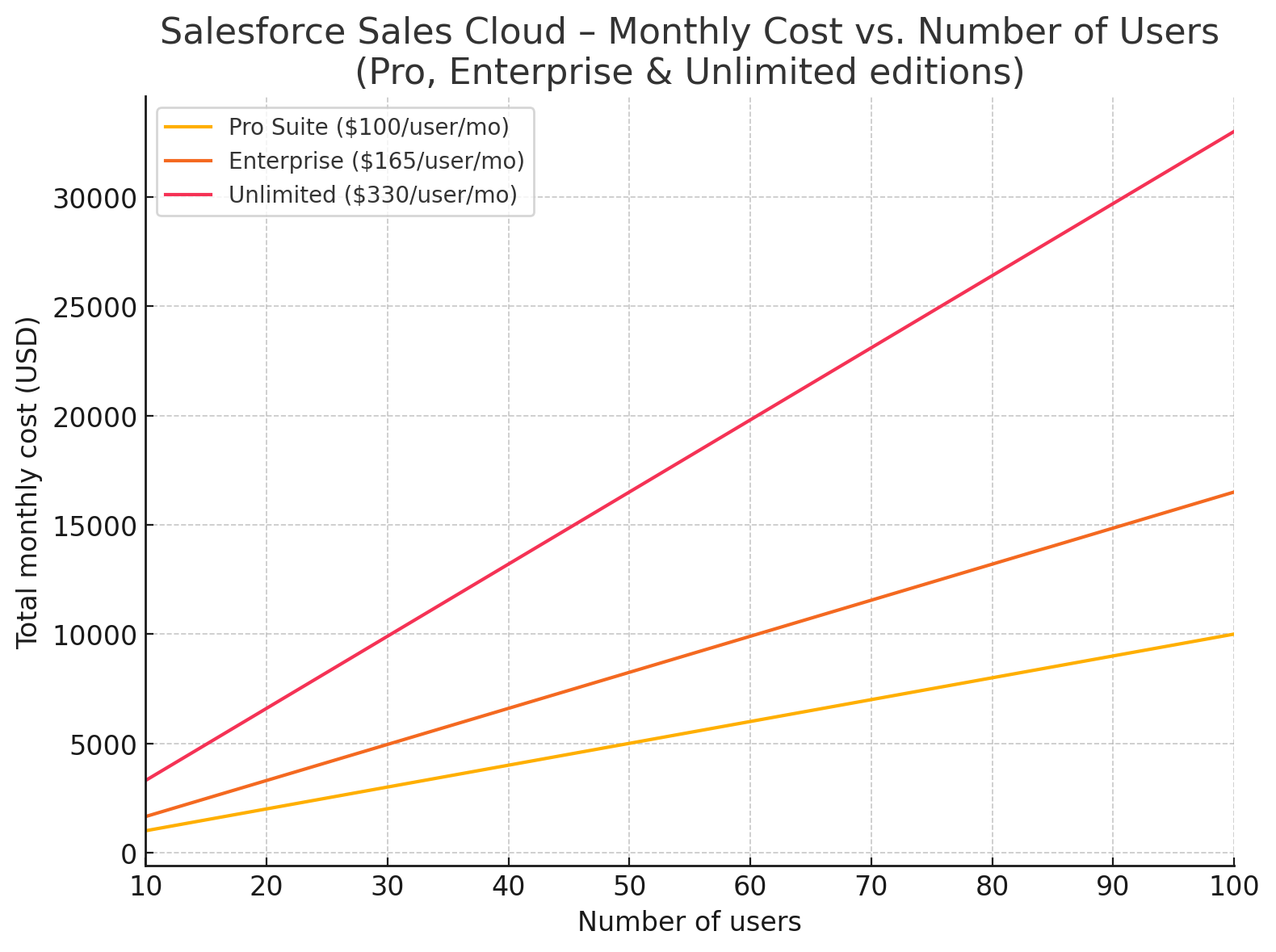
Openkoda: Open-Source Salesforce Alternative
What is Openkoda?
Openkoda is an MIT-licensed, open-source platform that helps teams build internal business apps especially those in the insurance market like claims management, policy management and embedded insurance, innovative insurance products, or full-blown enterprise systems for a variety of business branches without starting from scratch. This makes it a great alternative to Salesforce when open-source tech stack and ability to deploy the system on-premise is something you look for.
Under the hood it uses familiar tech—Java 17, Spring Boot 3, PostgreSQL and standard JavaScript—so any mainstream developer can jump in, fork the code and run it on-prem or in the cloud.
Ready-made foundations such as authentication, multitenancy, dashboards, audit logs and a REST API remove weeks of boilerplate, while industry templates let you ship new modules aimed at improving complex business processes up to 60 percent faster than traditional custom software development.

What Makes Openkoda Unique?
Openkoda stands out in the crowded landscape of enterprise application development platforms due to its open-source nature, flexibility, and focus on providing a complete and customizable environment for building business solutions.
Unlike many proprietary platforms, Openkoda is designed with transparency and user control at its core.
This allows organizations to fully own and modify the platform to meet their specific needs without being tied to a vendor’s roadmap or licensing costs.
A key aspect of what makes Openkoda unique is its commitment to integrating seamlessly with existing enterprise systems.
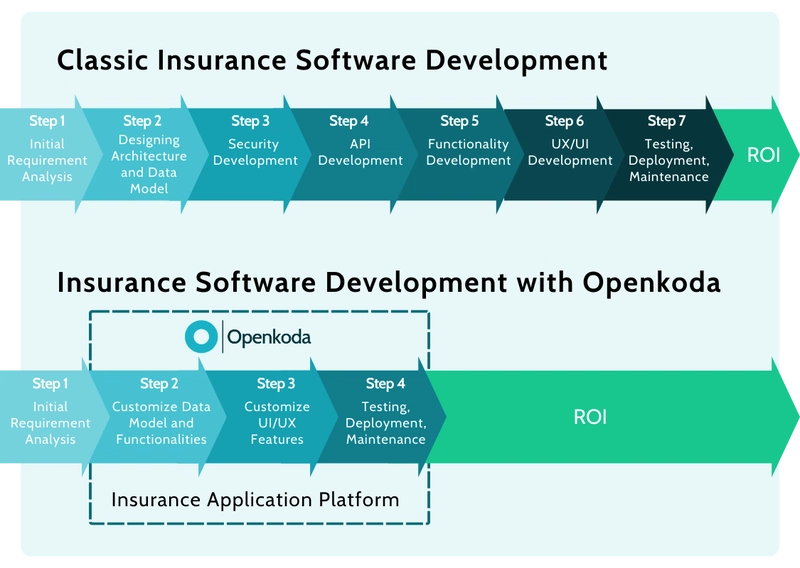
It offers robust APIs and integration capabilities that make it easier to connect with various third-party tools and services, ensuring that businesses can leverage their existing IT investments.
Additionally, Openkoda’s modular architecture is built to support rapid development and deployment, allowing companies to innovate faster and adapt to changing business requirements without the typical constraints imposed by closed platforms.
Multi-tenant options (shared schema, schema-per-org, or separate databases) scale from a single internal tool to a SaaS product, and built-in AI reporting tool can translate natural-language prompts into SQL for instant reporting
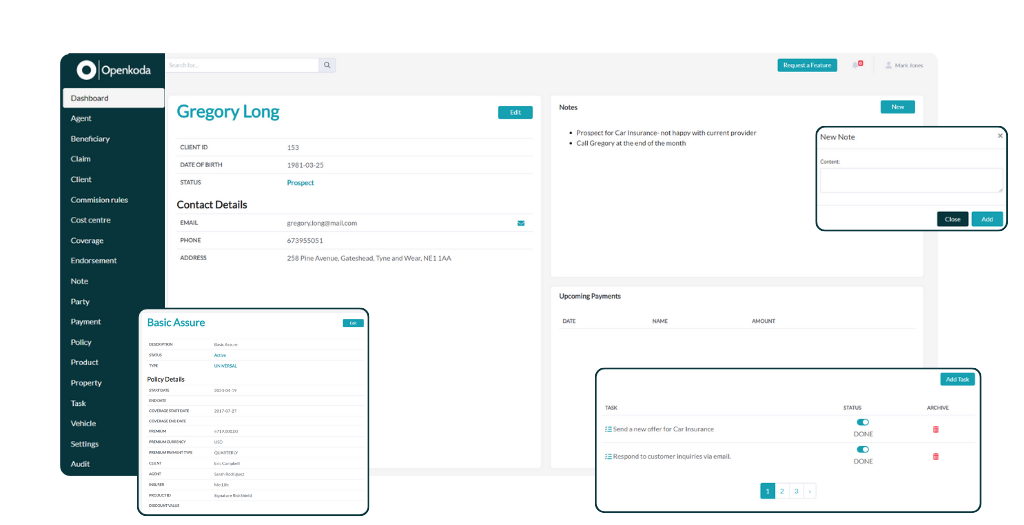
No Vendor Lock-in, no User-Based Pricing
Openkoda’s license grants unlimited users and unlimited features, so costs only increase with the compute resources or support you choose, there are no hidden per-seat fees waiting in next year’s budget.
You only pay for the initial development of bespoke building blocks: features tailored specifically to your business needs that truly impact your performance and efficiency.
After that, the only ongoing cost is the computing power required to run your software.
Even here, you have complete flexibility: whether you choose to deploy Openkoda on-premise or in a managed cloud environment, the decision is entirely yours.
No matter how many additional users join your organization, the cost of your custom system remains the same, allowing you to plan your IT budget with confidence, regardless of how quickly your business grows.
Don’t reinvent the wheel
Starting an enterprise project from a blank Git repo may feels “pure,” but most of the effort goes into plumbing that everyone needs but nobody sees: login screens, file stores, audit logs, health checks, multi-tenant scaffolding.
Building those basics again and again drains budgets and delays the features that actually move the business forward.
Openkoda ships that foundation out of the box, so your team can focus on the logic that makes the application unique instead of writing another user-registration flow or dashboard framework.
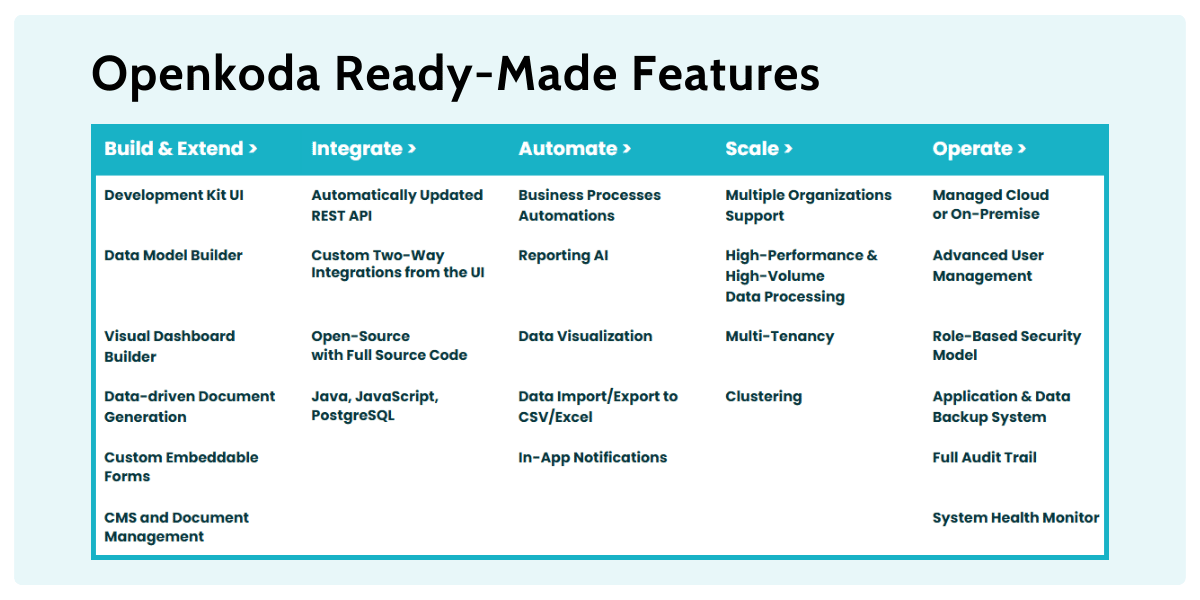
- Multiple authentication methods – plug-and-play support for LDAP/Active Directory, Google, Microsoft Teams, Facebook and other identity providers, with SAML SSO on the roadmap.
- Advanced resource management – built-in file repository (database, local disk or S3) plus application-level events you can observe and extend.
- External message-hub integrations – ready connectors for Slack, Jira, Trello, GitHub, Basecamp and more, so users get updates where they already work.
- Comprehensive user management – self-service registration, email verification, password resets and fine-grained role/privilege controls across or within organizations.
- Flexible multi-tenancy – choose shared-schema, schema-per-org or separate-database isolation, then scale or split clusters as load grows.
- Organization & team administration – invite members, brand each org, assign scoped roles and manage settings from a single UI.
- Application admin panel – real-time health metrics, log viewer and environment info at a glance.
- Workflow Automation
- CMS & page builder – versioned content, drag-and-drop dashboard widgets and page templates for internal or public resources.
- Event-driven communication – define custom events and listeners in the UI; trigger emails, notifications or scripts when business data changes for building modern customer service tools.
- Job request scheduling – cron-style scheduler for Java or server-side JavaScript jobs; ideal for nightly reconciliations or weekly exports.
- Email sender – SMTP-based transactional mailer you can call from code or automation rules.
- Automated backups – database and component backups you can schedule and store where you choose.
- Visual data model & dashboard builders – add tables, fields and drag-and-drop dashboards without touching code; changes propagate instantly to the UI and project management database.
- Smart reporting & AI SQL generator – write classic SQL or use natural-language prompts that Openkoda converts to queries and charts on the fly.
- Auto-generated REST API – every entity automatically exposes secure CRUD endpoints for painless integration.
[Read also: How to Build Insurance Application Faster]
Join Our Community!
We invite developers and enthusiasts to join the Openkoda community and contribute to this open-source platform.
Whether you’re an experienced developer or just beginning your journey, you can help by starring and sharing the Openkoda repository on GitHub to spread the word and increase visibility.
By joining our community in the link below, you can collaborate, share insights, and help shape the future of enterprise application development with Openkoda.